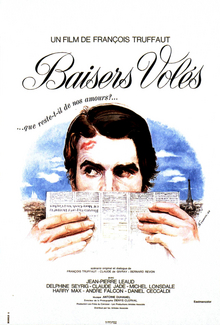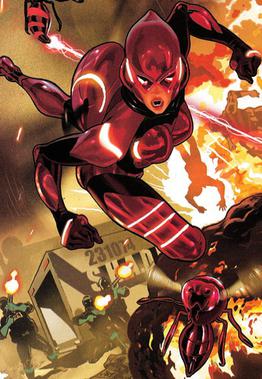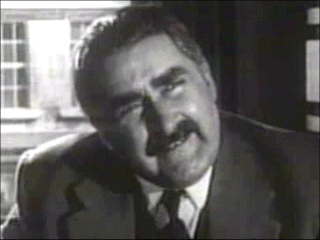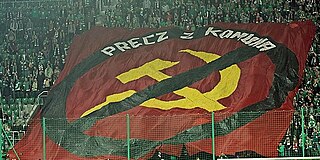
Pol Pot was a Cambodian communist revolutionary, politician and a dictator who ruled Cambodia as Prime Minister of Democratic Kampuchea between 1976 and 1979. Ideologically a communist and a Khmer ethnonationalist, he was a leading member of Cambodia's communist movement, the Khmer Rouge from 1963 to 1997, and served as General Secretary of the Communist Party of Kampuchea from 1963 to 1981. His administration converted Cambodia into a one-party communist state and perpetrated the Cambodian genocide.

Stolen Kisses is a 1968 French romantic comedy-drama film directed by François Truffaut, starring Jean-Pierre Léaud, Delphine Seyrig, and Claude Jade. It continues the story of the character Antoine Doinel, whom Truffaut had previously depicted in The 400 Blows (1959) and the short film Antoine and Colette (1962). In this film, Antoine begins his relationship with Christine Darbon, which is depicted further in the last two films in the series, Bed & Board (1970) and Love on the Run (1979).

Delphine Claire Beltiane Seyrig was a Lebanese-born French actress and film director. She came to prominence in Alain Resnais's 1961 film Last Year at Marienbad, and later acted in films by Chantal Akerman, Luis Buñuel, Marguerite Duras, Ulrike Ottinger, Francois Truffaut, and Fred Zinneman. She directed three films, including the documentary Sois belle et tais-toi (1981).

Red Bee is the name of two fictional superheroes appearing in American comic books.
La Cagoule was a French fascist-leaning and anti-communist terrorist group. It opposed the left-wing Popular Front and used violence to promote its activities in the final years of the Third Republic and into the Vichy Regime. La Cagoule was founded by Eugène Deloncle and backrolled, among others, by Eugène Schueller, the founder of L'Oréal.

Francis Marie de Wolff was an English character actor. Large, bearded, and beetle-browed, he was often cast as villains in both film and television.

Harry Kümel is a Belgian film director.

Robert Rae Cornthwaite was an American film and television character actor.

William Klein was an American-born French photographer and filmmaker noted for his ironic approach to both media and his extensive use of unusual photographic techniques in the context of photojournalism and fashion photography. He was ranked 25th on Professional Photographer's list of 100 most influential photographers.

Richard Loo was an American film actor who was one of the most familiar Asian character actors in American films of the 1930s and 1940s. He appeared in more than 120 films between 1931 and 1982.

Mitchell Lewis was an American film actor whose career as a Metro-Goldwyn-Mayer contract player encompassed both silent and sound films.

Daughters of Darkness is a 1971 erotic horror film co-written and directed by Harry Kümel and starring Delphine Seyrig, John Karlen, Andrea Rau, and Danielle Ouimet.
Giani Esposito was a French film actor and singer-songwriter.

Anti-communism is political and ideological opposition to communist beliefs, groups, and individuals. Organized anti-communism developed after the 1917 October Revolution in the Russian Empire, and it reached global dimensions during the Cold War, when the United States and the Soviet Union engaged in an intense rivalry. Anti-communism has been an element of many movements and different political positions across the political spectrum, including anarchism, centrism, conservatism, fascism, liberalism, nationalism, social democracy, socialism, leftism, and libertarianism, as well as broad movements resisting communist governance. Anti-communism has also been expressed by several religious groups, and in art and literature.
Electronic harassment, electromagnetic torture, or psychotronic torture is the delusional belief that malicious actors make use of electromagnetic radiation, radar, and surveillance techniques to transmit sounds and thoughts into people's heads, affect people's bodies, and harass people. Individuals who claim to experience this call themselves "targeted individuals" (TIs). Some claim they are victims of gang stalking and many have created or joined support and advocacy groups.
Jean Murat was a French actor. He was married to the French actress Annabella. He was one of the surviving passengers of the August 1923 Air Union Farman Goliath crash.

Paul Stanton was an American character actor and bit-part player in American films.
Jim Gérald was a French actor.

Madeleine Barbulée was a French film, stage and television actress.

Kong Kenan is a superhero appearing in comic books published by DC Comics and is known as the Super-Man of China. The character, who first appeared in New Super-Man # 1, was created by Gene Luen Yang and Viktor Bogdanovic.















